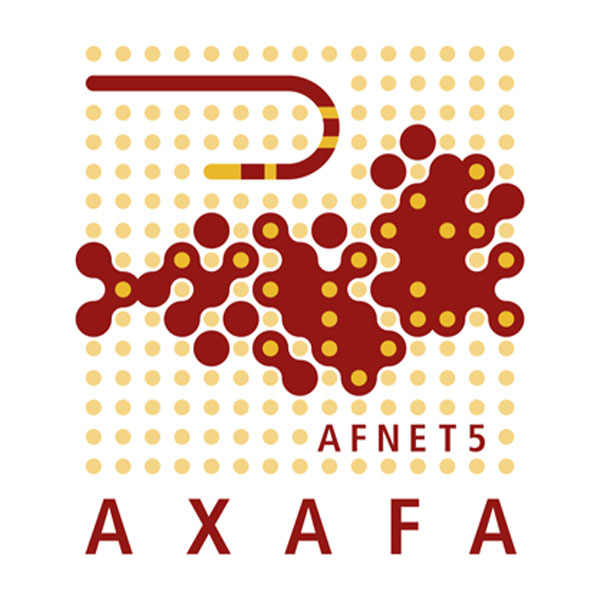
AXAFA-AFNET 5
Anticoagulation using the direct factor Xa inhibitor apixaban during Atrial Fibrillation catheter Ablation: Comparison to vitamin K antagonist therapy (AXAFA)
Study design
Investigator-driven, prospective, parallel-group, randomised, open, Blinded Outcome Assessment (PROBE),multi-centre trial to determine the optimal anticoagulation therapy for patients undergoing catheter ablation of atrial fibrillation

Inclusion Criteria
![]() Non-valvular AF (ECG-documented) with a clinical indication for catheter ablation
Non-valvular AF (ECG-documented) with a clinical indication for catheter ablation
![]() Clinical indication to undergo catheter ablation on continuous anticoagulant therapy
Clinical indication to undergo catheter ablation on continuous anticoagulant therapy
![]() Presence of at least one of the CHADS2 stroke risk factors
Presence of at least one of the CHADS2 stroke risk factors
- Stroke or TIA
- age ≥ 75 years,
- hypertension, defined as chronic treatment for hypertension, estimated need for continuous antihypertensive therapy or resting blood pressure > 145/90 mm Hg,
- diabetes mellitus,
- symptomatic heart failure (NYHA ≥ II).
![]() Age ≥ 18 years
Age ≥ 18 years
![]() Provision of signed informed consent
Provision of signed informed consent
General exclusion criteria
![]() Any disease that limits life expectancy to less than 1 year
Any disease that limits life expectancy to less than 1 year
![]() Participation in another clinical trial, either within the past two months or still ongoing
Participation in another clinical trial, either within the past two months or still ongoing
![]() Previous participation in AXAFA
Previous participation in AXAFA
![]() Pregnant women or women of childbearing potential not on adequate birth control: only women with a highly effective method of contraception (oral contraception or intra-uterine device) or sterile women can be randomised.
Pregnant women or women of childbearing potential not on adequate birth control: only women with a highly effective method of contraception (oral contraception or intra-uterine device) or sterile women can be randomised.
![]() Breastfeeding women
Breastfeeding women
![]() Drug abuse or clinically manifest alcohol abuse
Drug abuse or clinically manifest alcohol abuse
![]() Any stroke within 14 days before randomisation
Any stroke within 14 days before randomisation
![]() Coadministration with drugs that are strong dual inhibitors of cytochrome P450 3A4 (CYP3A4) and P-glycoprotein (P-gp) or strong dual inducers of CYP3A4 and P-gp (Appendix VIII).
Coadministration with drugs that are strong dual inhibitors of cytochrome P450 3A4 (CYP3A4) and P-glycoprotein (P-gp) or strong dual inducers of CYP3A4 and P-gp (Appendix VIII).
Exclusion criteria related to a cardiac condition
![]() Valvular AF (as defined by the focussed update of the ESC guidelines on AF, i.e. severe mitral valve stenosis, mechanical heart valve). Furthermore, patients who underwent mitral valve repair are not eligible for AXAFA.
Valvular AF (as defined by the focussed update of the ESC guidelines on AF, i.e. severe mitral valve stenosis, mechanical heart valve). Furthermore, patients who underwent mitral valve repair are not eligible for AXAFA.
![]() Any previous ablation or surgical therapy for AF
Any previous ablation or surgical therapy for AF
![]() Cardiac ablation therapy for any indication (catheter-based or surgical) within 3 months prior to randomisation
Cardiac ablation therapy for any indication (catheter-based or surgical) within 3 months prior to randomisation
![]() Clinical need for “triple therapy” (combination therapy of clopidogrel, acetylsalicylic acid, and oral anticoagulation
Clinical need for “triple therapy” (combination therapy of clopidogrel, acetylsalicylic acid, and oral anticoagulation
![]() Other contraindications for use of VKA or apixaban
Other contraindications for use of VKA or apixaban
![]() Documented atrial thrombi less than 3 months prior to randomisation
Documented atrial thrombi less than 3 months prior to randomisation
![]() Exclusion criteria based on laboratory abnormalities
Exclusion criteria based on laboratory abnormalities
![]() Severe chronic kidney disease with an estimated glomerular filtration rate (GFR) < 15 ml/min
Severe chronic kidney disease with an estimated glomerular filtration rate (GFR) < 15 ml/min
hypothesis
Anticoagulation with the direct factor Xa inhibitor apixaban is not less safe than Vitamin-K-antagonists (VKA) therapy in patients undergoing catheter ablation of non-valvular AF in the prevention of peri-procedural complications.
Conclusion
Continuous apixaban is safe and effective in patients undergoing atrial fibrillation ablation at risk of stroke with respect to bleeding, stroke, and cognitive function. Further research is needed to reduce ablation-related acute brain lesions.
PATIENTS
STUDY sites
in 9 countries
Study duration
Start of study
2015
End of study
2017
Study information for download
Publications
Haeusler KG, Eichner F. A.; Heuschmann P. U.; Fiebach J. B. Engelhorn T, Blank B, Callans D, Elvan A, Grimaldi M, Hansen J, Hindricks G, Al-Khalidi HR, Mont L, Cosedis Nielsen J, Piccini JP, Schotten U, Themistoclakis S, Vijgen J, di Biase L, Kirchhof P. MRI-Detected Brain Lesions and Cognitive Function in Patients With Atrial Fibrillation Undergoing Left Atrial Catheter Ablation in the Randomized AXAFA-AFNET 5 Trial. Circulation. 2022;145:906–915. doi: 10.1161/CIRCULATIONAHA.121.056320.
Zink MD, Chua W, Zeemering S, di Biase L, Bayes de Luna A, Callans D, Hindricks G, Haeusler KG, Al-Khalidi HR, Piccini JP, Mont L, Cosedis Nielsen J, Alberto Escobar L, de Bono J, Van Gelder IC, de Potter T, Scherr D, Themistoclakis S, Todd D, Kirchhof P, Schotten U. Predictors of recurrence of atrial fibrillation within the first 3 months after ablation. EP Europace. euaa132. doi: 10.1093/europace/euaa132.
Kloosterman M, Chua W, Fabritz L, Al-Khalidi HR, Schotten U, Nielsen JC, Piccini JP, Di Biase L, Häusler KG, Todd D, Mont L, Van Gelder IC, Kirchhof P. for the AXAFA-AFNET 5 investigators. Sex differences in catheter ablation of atrial fibrillation: results from AXAFA-AFNET 5. EP Europace. 2020 July; Volume 22; Issue 7; Pages 1026–1035. doi: 10.1093/europace/euaa015.
Kirchhof P, Haeusler KG, Blank B, De Bono J, Callans D, Elvan A, Fetsch T, Van Gelder IC, Gentlesk P, Grimaldi M, Hansen J, Hindricks G, Al-Khalidi HR, Massaro T, Mont L, Nielsen JC, Nölker G, Piccini JP, De Potter T, Scherr D, Schotten U, Themistoclakis S, Todd D, Vijgen J, Di Biase L. Apixaban in patients at risk of stroke undergoing atrial fibrillation ablation. Eur Heart J. 2018 Aug 21; 39 (32): 2942 – 2955; 00,1-14. doi: 10.1093/eurheartj/ehy176. Epub 2018 Mar 20.
Di Biase L, Callans D, Georg Haeusler K, Hindricks G, Al-Khalidi H, Mont L, Cosedis Nielsen J, Piccini JP, Schotten U, Kirchhof P. Rationale and design of AXAFA-AFNET 5: an investigator-initiated, randomized, open, blinded outcome assessment, multi-centre trial to comparing continuous apixaban to vitamin K antagonists in patients undergoing atrial fibrillation catheter ablation. Europace. 2017 Jan;19(1):132-138. doi: 0.1093/europace/euw368. Epub 2016 Oct 14
Coordinating Investigator

Prof. Paulus Kirchhof
Birmingham / Münster
Further information
Registration
EudraCT number: 2014-002442-45
ClinicalTrials.gov: NCT02227550
ISRCTN: ISRCTN87711003
support
Sponsor
Kompetenznetz Vorhofflimmern e.V. (Atrial Fibrillation NETwork, AFNET), Münster, Germany